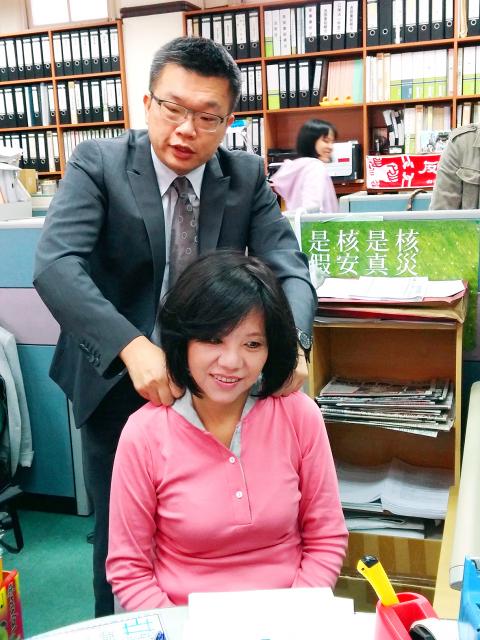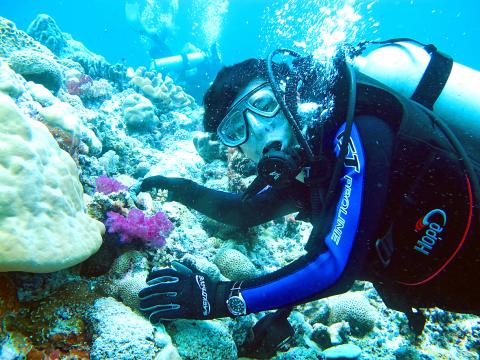There is more going on in legislators’ lives than just drafting laws, making policy addresses and negotiating in the legislature, Democratic Progressive Party (DPP) legislators Tsai Chi-chang (蔡其昌) and Chen Chi-mai (陳其邁) said.
Tsai is a self-taught masseur, while Chen is a certified master scuba diver.
Tsai said he learned the art of massage because he has been plagued by neck pain for years.

Photo: Tseng Wei-chen, Taipei Times
He first developed neck problems when he was director of the then-Taichung County’s Civil Affairs Bureau and the county’s government-council liaison from 1997 to 2001, a job that strained both his body and soul, Tsai said.
SEEKING RELIEF
He tried everything from massage to acupuncture and Pilates to seeing a chiropractor to alleviate the pain, which is how he learned about the human form and its pressure points, he said.

Photo: Courtesy of Chen Chi-mai
His condition had been excruciating up until 2004, when he first became a lawmaker, but it has gradually abated as he learned to master his own body, Tsai said.
Massage is one of the most convenient therapies that is not spatially limited, Tsai said.
Among those frequenting his “clinic” are his mother and wife, and a short massage session relieves their soreness as he works on their pressure points, the lawmaker said.
Other legislators have also benefited from his skills.
Prior to a DPP press conference late last year, an exhausted DPP Legislator Yeh Yi-jin (葉宜津) told Tsai that she had been suffering from muscle aches for a while, so he gave her a short massage session, which helped her, Tsai said.
Tsai said everyone should learn how to relax their body and mind, and they should also learn proper training methods to build their muscles to reduce muscle aches and soreness.
Chen is equally enthusiastic about scuba diving, a passion that his wife, son and daughter have also embraced.
The entire family are licensed divers, said Chen, who also hosts of an online diving community.
Snorkeling near Kenting National Park in Pingtung County initiated him into the wonders of the undersea world, he said.
A series of discounted scuba courses offered by a diving club at National Taiwan University fueled his enthusiasm.
UNDERWATER HOLIDAYS
In addition to diving off of Green Island (綠島) and Orchid Island (蘭嶼, also known as Lanyu), Chen has visited several popular Pacific Ocean destinations in Palau, Malaysia and Indonesia, he said, adding that he had taken diving trips with former DPP legislators Chiu Tai-san (邱太三) and Lee Wen-chung (李文忠).
Scuba diving relaxes one mentally and physically, and three dives are all one needs for a perfect holiday, he said.
However, divers should also be aware of the dangers they face and should never go diving alone, he said. Raptures of the deep caused by nitrogen narcosis and decompression sickness — which can occur when a diver tries to surface too quickly — are just some of the risks, he said.
Diving in groups can minimize the risks, he said.
The waters around Taiwan and neighboring countries are diverse and beautiful, so it is a shame that so few Taiwanese learn to scuba dive, Chen said.
He said Sipadan in Malaysia was the best diving site he has visted, although Palau is his favorite spot.

Several Chinese Nationalist Party (KMT) officials including Chairman Eric Chu (朱立倫) are to be summoned for questioning and then transferred to prosecutors for holding an illegal assembly in Taipei last night, the Taipei Police said today. Chu and two others hosted an illegal assembly and are to be requested to explain their actions, the Taipei City Police Department's Zhongzheng (中正) First Precinct said, referring to a protest held after Huang Lu Chin-ju (黃呂錦茹), KMT Taipei's chapter director, and several other KMT staffers were questioned for alleged signature forgery in recall petitions against Democratic Progressive Party (DPP) legislators. Taipei prosecutors had filed

Taiwan would welcome the return of Honduras as a diplomatic ally if its next president decides to make such a move, Minister of Foreign Affairs Lin Chia-lung (林佳龍) said yesterday. “Of course, we would welcome Honduras if they want to restore diplomatic ties with Taiwan after their elections,” Lin said at a meeting of the legislature’s Foreign Affairs and National Defense Committee, when asked to comment on statements made by two of the three Honduran presidential candidates during the presidential campaign in the Central American country. Taiwan is paying close attention to the region as a whole in the wake of a

President William Lai (賴清德) has appointed former vice president Chen Chien-jen (陳建仁) to attend the late Pope Francis’ funeral at the Vatican City on Saturday on his behalf, the Ministry of Foreign Affairs said today. The Holy See announced Francis’ funeral would take place on Saturday at 10am in St Peter’s Square. The ministry expressed condolences over Francis’ passing and said that Chen would represent Taiwan at the funeral and offer condolences in person. Taiwan and the Vatican have a long-standing and close diplomatic relationship, the ministry said. Both sides agreed to have Chen represent Taiwan at the funeral, given his Catholic identity and

Lawmakers from the Democratic Progressive Party (DPP) yesterday established a friendship group with their counterparts in Ukraine to promote parliamentary exchanges between the two countries. A ceremony in Taipei for the Taiwan-Ukraine Parliamentary Friendship Association, initiated by DPP Legislator Chen Kuan-ting (陳冠廷), was attended by lawmakers and officials, including Deputy Minister of Foreign Affairs Francois Wu (吳志中) and European Economic and Trade Office in Taiwan Director Lutz Gullner. The increasingly dire situation in Ukraine is a global concern, and Taiwan cannot turn its back when the latter is in need of help, as the two countries share many common values and interests,